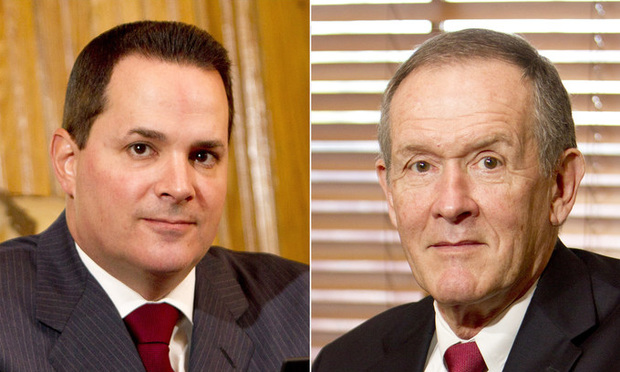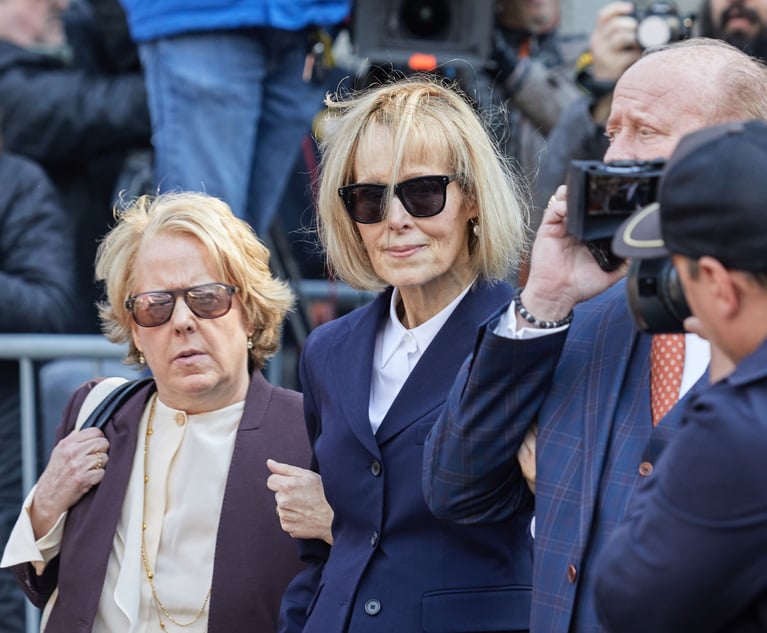On Remand From High Court, Waffle House 'Sextortion' Suit Back in Court of Appeals
After a jury acquitted the former housekeeper and her lawyers of criminal charges related to secretly video recording former Waffle House CEO Joe Rogers Jr. engaged in a sex act, the Georgia Supreme Court sent the related civil appeals back to the Court of Appeals for reconsideration.
June 14, 2018 at 04:15 PM
7 minute read
 David Cohen (left) and John Butters
David Cohen (left) and John Butters
The same Georgia Supreme Court decision that reinstated criminal charges against the former housekeeper for ex-Waffle House CEO Joe Rogers Jr. and her two lawyers for secretly recording Rogers in a sexual encounter—charges a jury rejected in April—is now the basis for renewed arguments over related civil litigation at the Court of Appeals.
Within days of a jury's acquittal of Mye Brindle and her former attorneys David Cohen and John Butters on charges including unlawful surveillance, the high court remanded a 2017 opinion greenlighting Rogers' civil suit against the attorneys.
The parties have filed new briefs in recent days, with each side claiming the Supreme Court's ruling in State v. Cohen et al. bolsters their position.
Rogers' lawyers argue the justices' ruling established the lawyers violated Georgia's surveillance statute and that the criminal acquittals have no probative legal impact on the civil case.
Cohen and Butters' new appellate brief counters that the acquittals “underscore the error that lies in allowing mere allegations of illegal and tortious conduct—allegations that proved to be wrong—to override fundamental constitutional protections.”
The morass of litigation began in 2012 when Brindle retained Cohen and Butters to handle claims of sexual harassment against Rogers, whom she said coerced her to conduct sexual acts as part of her duties.
The lawyers helped Brindle acquire a small camera, and she used to recorded an encounter in Rogers' bedroom. Shortly thereafter, the lawyers sent Rogers a demand letter saying they were preparing to file suit.
During a mediation, Brindle and her lawyers reportedly asked for $12 million to drop the matter.
Instead, Rogers sued Brindle in Cobb County Superior Court for invasion of privacy and intentional infliction of emotional distress. Among his allegations was that a demand letter the lawyers sent seeking a settlement conference was attempted extortion.
In 2015 Cobb Superior Court Judge Robert Leonard III disqualified Butters and Cohen from representing Brindle, ruling they had advised her in the commission of a crime and could be called as witnesses against her.
Leonard also refused Butters and Cohen's motion to dismiss Rogers' claim as an improper strategic lawsuit against public participation, or anti-SLAPP lawsuit.
The Court of Appeals upheld the lawyers' disqualifications in 2016.
Last year, it followed up with an 80-page ruling in which a six-judge majority agreed Rogers' suit was not barred by the anti-SLAPP statute.
Meanwhile, Fulton County District Attorney Paul Howard Jr. challenged Judge Henry Newkirk's decision throwing out the criminal charges against Butters, Cohen and Brindle in the state Supreme Court.
The justices issued a opinion in November agreeing that Newkirk was correct to dismiss the first count of the criminal indictment, conspiracy to commit extortion.
But the high court reinstated the felony charges of violating the state's eavesdropping and surveillance law that the trio was acquitted of in April.
In remanding the civil litigation back to the Court of Appeals, the justices said the lower court should look to its opinion in State v. Cohen for guidance.
Cohen and Butters' lawyers, Bondurant Mixson & Elmore partners John Floyd, Michael Terry and Tiana Mykkeltvedt, argued in a May 29 brief that the high court's ruling in the criminal case “destroys the two pillars upon which Rogers' case is built.”
“Rogers has consistently cast himself as a victim of extortion, and the [Court of Appeals] majority opinion concluded that this case 'centers on Rogers' allegations that the defendants engaged in an extortion scheme,” the brief said.
But the justices “eliminated Rogers extortion theory by holding there was no extortion as a matter of law because 'there was no agreement to unlawfully obtain property from Rogers by 'threatening' him in this case in any manner that could serve as a proper basis for a charge of illegal extortion” under the law.
“Secondly, Rogers' reliance on a supposedly 'illegal' video has also been overtaken by subsequent events,” the brief said. “In State v. Cohen, the Supreme Court acknowledged that the creation of the video evidence was also constitutionally protected because alleged threats to 'file a lawsuit … and use the video as evidence in a court of law in the context of possible litigation' do not constitute extortion.”
“Rogers' efforts to exploit the criminal process spectacularly backfired when, after viewing the video at issue, a Fulton County jury acquitted Brindle, Cohen and Butters of charges arising out of Georgia's unlawful surveillance statute,” it said.
The lawyers' brief said that Georgia's anti-SLAPP and abusive litigation statutes—coupled with longstanding court precedent protecting the right of citizens to petition the courts for redress under the First Amendment—demands that the case be dismissed.
“The threat that this case poses to the civil justice system and to the legal profession cannot be overstated,” it said.
In an email, Floyd said “the Constitution gives Ms. Brindle breathing space to litigate her claims against Mr. Rogers without being prosecuted or having her attorneys sued for daring to assert them. The anti-SLAPP statute and federal constitutional law protect that breathing space.”
“Especially now that the Supreme Court has held there was no extortion as a matter of law and Ms. Brindle and her attorneys have been acquitted of unlawful surveillance, the case against her attorneys should be dismissed,” he added.
Rogers' brief, filed by Polsinelli lawyers William Hill Jr., Joseph Sharp and Alex Bartko, argued that Cohen's and Butters' arguments “ignore dispositive differences between the criminal case and this matter and mischaracterize State v. Cohen as holding that [their] tortious and illegal conduct is protected by the First Amendment.”
Cohen and Butters “contend that State v. Cohen stands for the proposition that their illegal video is constitutionally protected,” Rogers' lawyers wrote. But the justices in fact “reversed the trial court's dismissal of the counts related to the video and rejected Cohen and Butters' assertion that only one party must consent to being videoed and that Rogers' bedroom was a public place.“
“Betraying the weakness of their position,” the brief continued, “Cohen and Butters also interject into this appeal the verdict in the criminal case, claiming that the verdict is dispositive of Rogers' civil claims. Of course, the verdict has no preclusive effect, the verdict and related exhibits … are not part of the record, and Cohen and Butters cite no authority supporting their position.”
“Taken to its logical conclusion,” Rogers' brief said, “Cohen and Butters argument is that State v. Cohen provides that a lawyer and his client are entitled to and have a constitutional right to violate the illegal surveillance statute, video someone without his knowledge and consent in his bedroom engaged in a sex act, and use the video coupled with threats to disclose publicly the sexual relationship and video and destroy every facet of his life in an attempt to extract money from him.”
“Of course, State v. Cohen does not provide support for any such proposition,” it said.
None of the Rogers' attorneys responded to requests for comment.
This content has been archived. It is available through our partners, LexisNexis® and Bloomberg Law.
To view this content, please continue to their sites.
Not a Lexis Subscriber?
Subscribe Now
Not a Bloomberg Law Subscriber?
Subscribe Now
NOT FOR REPRINT
© 2025 ALM Global, LLC, All Rights Reserved. Request academic re-use from www.copyright.com. All other uses, submit a request to [email protected]. For more information visit Asset & Logo Licensing.
You Might Like
View All
Sanctions Order Over Toyota's Failure to Provide English Translations of Documents Vacated by Appeals Court
4 minute read
Second Circuit Upholds $5M Judgment Against Trump in E. Jean Carroll Case
4 minute read
'Paragraph V Displaced Lathrop': High Court Mulls Sovereign Immunity Waiver Disputes
7 minute read
11th Circuit Revives Project Veritas' Defamation Lawsuit Against CNN
Trending Stories
- 1President-Elect Donald Trump Sentenced to Unconditional Discharge
- 2JCPenney Customer's Slip-and-Fall From Bodily Substance Suit Best Left for a Jury to Decide, Judge Rules
- 3Products Liability: The Absence of Other Similar Claims—a Defense or a Misleading Effort to Sway a Jury?
- 4529 Accounts Are Not Your Divorce Piggybank
- 5Meta Hires Litigation Strategy Chief, Tapping King & Spalding Partner Who Was Senior DOJ Official in First Trump Term
Who Got The Work
Michael G. Bongiorno, Andrew Scott Dulberg and Elizabeth E. Driscoll from Wilmer Cutler Pickering Hale and Dorr have stepped in to represent Symbotic Inc., an A.I.-enabled technology platform that focuses on increasing supply chain efficiency, and other defendants in a pending shareholder derivative lawsuit. The case, filed Oct. 2 in Massachusetts District Court by the Brown Law Firm on behalf of Stephen Austen, accuses certain officers and directors of misleading investors in regard to Symbotic's potential for margin growth by failing to disclose that the company was not equipped to timely deploy its systems or manage expenses through project delays. The case, assigned to U.S. District Judge Nathaniel M. Gorton, is 1:24-cv-12522, Austen v. Cohen et al.
Who Got The Work
Edmund Polubinski and Marie Killmond of Davis Polk & Wardwell have entered appearances for data platform software development company MongoDB and other defendants in a pending shareholder derivative lawsuit. The action, filed Oct. 7 in New York Southern District Court by the Brown Law Firm, accuses the company's directors and/or officers of falsely expressing confidence in the company’s restructuring of its sales incentive plan and downplaying the severity of decreases in its upfront commitments. The case is 1:24-cv-07594, Roy v. Ittycheria et al.
Who Got The Work
Amy O. Bruchs and Kurt F. Ellison of Michael Best & Friedrich have entered appearances for Epic Systems Corp. in a pending employment discrimination lawsuit. The suit was filed Sept. 7 in Wisconsin Western District Court by Levine Eisberner LLC and Siri & Glimstad on behalf of a project manager who claims that he was wrongfully terminated after applying for a religious exemption to the defendant's COVID-19 vaccine mandate. The case, assigned to U.S. Magistrate Judge Anita Marie Boor, is 3:24-cv-00630, Secker, Nathan v. Epic Systems Corporation.
Who Got The Work
David X. Sullivan, Thomas J. Finn and Gregory A. Hall from McCarter & English have entered appearances for Sunrun Installation Services in a pending civil rights lawsuit. The complaint was filed Sept. 4 in Connecticut District Court by attorney Robert M. Berke on behalf of former employee George Edward Steins, who was arrested and charged with employing an unregistered home improvement salesperson. The complaint alleges that had Sunrun informed the Connecticut Department of Consumer Protection that the plaintiff's employment had ended in 2017 and that he no longer held Sunrun's home improvement contractor license, he would not have been hit with charges, which were dismissed in May 2024. The case, assigned to U.S. District Judge Jeffrey A. Meyer, is 3:24-cv-01423, Steins v. Sunrun, Inc. et al.
Who Got The Work
Greenberg Traurig shareholder Joshua L. Raskin has entered an appearance for boohoo.com UK Ltd. in a pending patent infringement lawsuit. The suit, filed Sept. 3 in Texas Eastern District Court by Rozier Hardt McDonough on behalf of Alto Dynamics, asserts five patents related to an online shopping platform. The case, assigned to U.S. District Judge Rodney Gilstrap, is 2:24-cv-00719, Alto Dynamics, LLC v. boohoo.com UK Limited.
Featured Firms
Law Offices of Gary Martin Hays & Associates, P.C.
(470) 294-1674
Law Offices of Mark E. Salomone
(857) 444-6468
Smith & Hassler
(713) 739-1250






